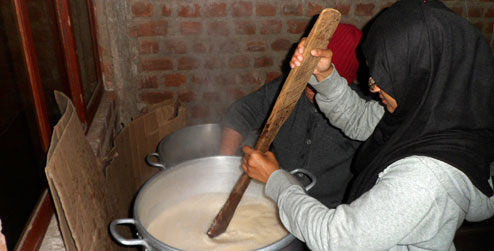Combine women in a kitchen, a strong dose of passion and the ability to organise, and a Peruvian Soup Kitchen is born.
A soup kitchen, commonly known as ‘Comedor’ in Peru, is a community organisation that provides food for thousands of people living in poverty in shantytowns like Villa El Salvador. Taking advantage of buying in bulk, this initiative, which is almost exclusively run by women, provides a platform where the poorest families come together to produce evening meals, and feed around seven percent of Lima’s population.
These kitchens started in the 1970s in response to the poverty faced by the people, and through harsher economic climates have exploded in growth. Women of the families – whether mothers or grandmothers – who with rising food prices are finding it hard to give their families a sufficient meal, take turns on alternate days to buy, prepare and distribute these meals everyday.
Throughout the last few weeks many of us were able to help at the Comedor near our host home in Villa El Salvador; as well as accompanying the ladies to the market, sharing jokes with them in broken Spanish and even being fed some of the delicious food prepared. Although little more than two basic cooking hobs, a single room and a tin roof, we have witnessed how these women are able to help themselves and their families amidst the adversity of their situations devoid of any government help.
The voices of the women have also been able to force the government to implement the ‘Vaso de Leche’ (glass of milk) programme, which provides a big glass of milk containing some nutritious oats, to the poorest children, and pregnant and nursing women.

Just like the Comedor, it is also run by women in a basic kitchen. Waking up for a 4am start, we were able to help a lady named Marta, who works from her home across the road from us, to prepare the milk. We cut up porridge bags, opened milk tins and stirred them in a big pot. Whilst doing so, she talked about the issues the people faced, particularly that although the programme is supposed to be free, people now have to pay two soles for the glass of milk (which is provided five times a week) due to the newly elected government no longer paying for the gas for the preparation.
However despite the problems and obstacles, these women, some part of the highly active Women’s Federation, are a great example of how together with planning, organisation and participation – the very foundations of Villa El Salvador – change and solutions can occur.
By ICS volunteer Farah Hossain.
Photos: (top) women preparing a meal at the 'comedor' in Villa El Salvador, Peru; (middle) Farah stirring the pot for the ‘Vaso de Leche’ programme.



